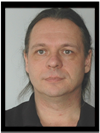Conference Chairs
posted 22 Jul 2006
- Thomas Lengauer, Conference Chair, Max-Planck Institute for Informatics, Saarbrücken, Germany
- Burkhard Rost, Conference Co-chair, Columbia University, New York, NY, USA
- Peter Schuster, Conference Co-chair, University of Vienna, Vienna Austria
 Thomas Lengauer (born 1952) is Director at the Max-Planck Institute for Informatics in Saarbrucken, Germany. His background is in Math (Ph.D. Berlin, Germany 1976) and Computer Science (Ph.D, Stanford 1979). In the seventies he performed research in theoretical computer science, in the 80s on design methods for integrated circuits. He has been engaged in research in computational biology since the beginning of the 90s. His major focuses of research are protein bioinformatics, computational drug screening and design and bioinformatics for understanding and curing diseases. Previously, he held the positions of a full professor at the University of Paderborn, Germany (1984-1992) and of a Director of the Institute for Algorithms and Scientific Computing at the German National Research Center for Computer Science in Sankt Augustin, near Bonn Germany (1992-2001). Dr. Lengauer is a founding member of the International Society for Computational Biology (ISCB), a member of the steering board of the international conference series RECOMB, and he headed the steering board of the European bioinformatics conference series ECCB since its foundation in 2002 until 2005. In 2001 he co-founded the BioSolveIT GmbH, Sankt Augustin, Germany, which develops and distributes Cheminformatics software. In 2003 he received the Konrad Zuse Medal of the German Informatics Society and the Karl Heinz Beckurts Award. He is a member of the German Academy of Sciences Leopoldina.
Thomas Lengauer (born 1952) is Director at the Max-Planck Institute for Informatics in Saarbrucken, Germany. His background is in Math (Ph.D. Berlin, Germany 1976) and Computer Science (Ph.D, Stanford 1979). In the seventies he performed research in theoretical computer science, in the 80s on design methods for integrated circuits. He has been engaged in research in computational biology since the beginning of the 90s. His major focuses of research are protein bioinformatics, computational drug screening and design and bioinformatics for understanding and curing diseases. Previously, he held the positions of a full professor at the University of Paderborn, Germany (1984-1992) and of a Director of the Institute for Algorithms and Scientific Computing at the German National Research Center for Computer Science in Sankt Augustin, near Bonn Germany (1992-2001). Dr. Lengauer is a founding member of the International Society for Computational Biology (ISCB), a member of the steering board of the international conference series RECOMB, and he headed the steering board of the European bioinformatics conference series ECCB since its foundation in 2002 until 2005. In 2001 he co-founded the BioSolveIT GmbH, Sankt Augustin, Germany, which develops and distributes Cheminformatics software. In 2003 he received the Konrad Zuse Medal of the German Informatics Society and the Karl Heinz Beckurts Award. He is a member of the German Academy of Sciences Leopoldina.
 Burkhard Rost obtained his doctoral degree (Dr. rer. nat.) from the University of Heidelberg (Germany) in the field of theoretical physics. He began his research working on the thermo-dynamical properties of spin glasses and brain-like artificial neural networks. He moved briefly (1988-1990) in peace/arms control research designing simple non-intrusive sensor networks to monitor aircraft. He entered the field of molecular biology at the European Molecular Biology Laboratory (EMBL, Heidelberg, Germany, 1990-1995), spent a year at the European Bioinformatics Institute (EBI, Hinxton, Cambridgshire, England, 1995), returned to the EMBL (1996-1998), joined the company LION Biosciences for a brief interim (1998), and arrived at Columbia University in 1998. In 1992, Dr. Rost developed the first Internet server for structure prediction (PredictProtein), and contributed a number of methods that predict aspects of protein structure.
Burkhard Rost obtained his doctoral degree (Dr. rer. nat.) from the University of Heidelberg (Germany) in the field of theoretical physics. He began his research working on the thermo-dynamical properties of spin glasses and brain-like artificial neural networks. He moved briefly (1988-1990) in peace/arms control research designing simple non-intrusive sensor networks to monitor aircraft. He entered the field of molecular biology at the European Molecular Biology Laboratory (EMBL, Heidelberg, Germany, 1990-1995), spent a year at the European Bioinformatics Institute (EBI, Hinxton, Cambridgshire, England, 1995), returned to the EMBL (1996-1998), joined the company LION Biosciences for a brief interim (1998), and arrived at Columbia University in 1998. In 1992, Dr. Rost developed the first Internet server for structure prediction (PredictProtein), and contributed a number of methods that predict aspects of protein structure.
His major research contribution has been the combination of machine learning tools and evolutionary information. His academic research goal is to contribute toward the understanding of molecular evolution; his technical objective is to contribute toward a coarse-grained modeling of a cell. Current research focuses on the prediction of protein function from sequence and structure and structure prediction. It includes the prediction of subcellular localization, of protein-protein and protein-substrate interactions, the prediction of impacts of residues mutations, the analysis of protein networks, the development of a dynamic view of the protein sequence/structure universe, the development of improved alignment algorithms, and the development of software systems that meet today’s challenges.
 Peter Schuster was born in Vienna in 1941. He studied chemistry and physics at Vienna University. In the year 1967 he received his PhD in chemistry and then worked as PostDoc researcher with Manfred Eigen at the Max-Planck-Institute for Biophysical Chemistry in Göttingen (Germany). Afterwards, in 1973, he returned to Vienna where he became full professor of Theoretical Chemistry at Vienna University. In the years 1992 – 1995 he took a leave of absence from Vienna and was founding director of the Institute for Molecular Biotechnology in Jena (Germany). Since 1990 he is a member of the external faculty of the Santa Fe Institute in Santa Fe (U.S.A.). He is member of the German Academy of Sciences Leopoldina and currently President of the Austrian Academy of Sciences. In 1995 Peter Schuster received the Phillips-Morris Award and in 1999 the Wilhelm-Exner Medal. His main research interests are bioinformatics and structure prediction of ribonucleic acids, the study of mechanisms of biological evolution by means of molecular models, the design of molecules for predefined purposes as well as the application of inverse methods in computational systems biology.
Peter Schuster was born in Vienna in 1941. He studied chemistry and physics at Vienna University. In the year 1967 he received his PhD in chemistry and then worked as PostDoc researcher with Manfred Eigen at the Max-Planck-Institute for Biophysical Chemistry in Göttingen (Germany). Afterwards, in 1973, he returned to Vienna where he became full professor of Theoretical Chemistry at Vienna University. In the years 1992 – 1995 he took a leave of absence from Vienna and was founding director of the Institute for Molecular Biotechnology in Jena (Germany). Since 1990 he is a member of the external faculty of the Santa Fe Institute in Santa Fe (U.S.A.). He is member of the German Academy of Sciences Leopoldina and currently President of the Austrian Academy of Sciences. In 1995 Peter Schuster received the Phillips-Morris Award and in 1999 the Wilhelm-Exner Medal. His main research interests are bioinformatics and structure prediction of ribonucleic acids, the study of mechanisms of biological evolution by means of molecular models, the design of molecules for predefined purposes as well as the application of inverse methods in computational systems biology.




